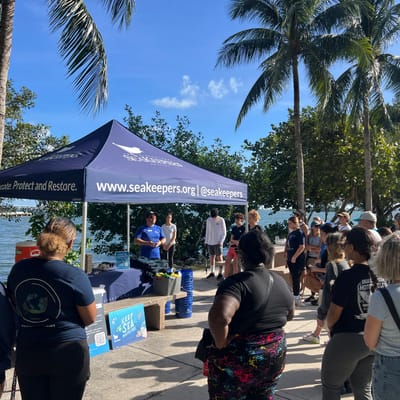Monthly Margaret Pace Park Cleanup
Miami, Florida
November 9, 2024
Overview
On the morning of November 9th, 2024, The International SeaKeepers Society hosted our monthly cleanup at Margaret Pace Park in Miami. We were joined by 77 volunteers who received a quick background briefing on the area before they grabbed gear and spread out around the park. It had been a few months since the last SeaKeepers cleanup at Margaret Pace, so we expected to see and make a large impact cleaning up the park. Our volunteers were able to collect data to be shared with scientists on the most common types of trash through the use of Citizen Science app Marine Debris Tracker. After just two hours of hard work, we had removed more than 244 lbs of trash from the park, leaving behind a cleaner ecosystem for people and animals to enjoy. One of our volunteers even managed to find and rescue an injured laughing gull, a species of seabird, which through reaching out to the South Florida Seabird Station our Science Liaison, Katie, was able to have a volunteer arrive and ensure the bird was taken to a hospital for proper care. Our amazing team of volunteers even got their hands dirty by wading into the shallow water at the waterline and found a great deal of thin and sheet plastics such as wrappers and fishing line. We finished the day by discussing some of the craziest finds we had, discussing what we can do in our day to day lives as south Florida residents to reduce our plastic usage as well as reduce overall pollution. By reducing our plastic use and opting for sustainable alternatives, the park would not have nearly as much waste on such a consistent level. We give a huge thanks to our volunteers for joining us and for their incredible work and look forward to seeing some of them at future SeaKeepers events!
Marine Debris Tracker is a data collection app that allows the general public to contribute to an open-date platform and scientific research by recording the different types of litter, specifically plastic pollution, that they find in either inland or marine environments. Marine Debris Tracker was developed by the University of Georgia’s Jambeck Research Group, which SeaKeepers worked with in 2021 when the Jambeck Research Group collaborated with Ocean Conservancy to assess Miami’s plastic waste management, known as a Circularity Assessment Protocol. SeaKeepers again assisted the Jambeck Research Group’s Circularity Informatics Lab in 2022 with another Circularity Assessment Protocol in the Florida Keys. The researchers of the Jambeck Lab use the Marine Debris Tracker app to record their data, and with citizen scientists also using the app, more data can be collected in different areas. Using Marine Debris Tracker at our cleanups involves community members in creating a bigger picture of plastic pollution, and provides the means for new scientific findings to be generated as well as for effective local legislation to be informed. SeaKeepers is excited to be incorporating this app at our cleanups and continue our mission of coastal education, protection, and restoration. Overall, we had 25% of volunteers utilize Marine Debris Tracker at this cleanup.


You must be logged in to post a comment.